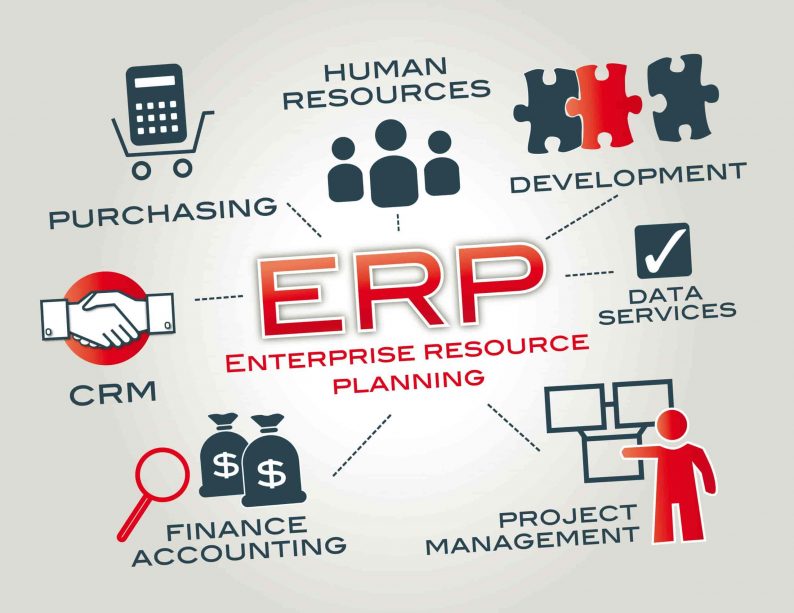Successful ERP implementations focus on business benefits and outcomes
15 Jan 2020 | by Brett Mundell
This post explains why a successful ERP solution implementation starts with focusing on the business benefits and outcomes you want to achieve.
In his popular book The Seven Habits of Highly Effective People, business leadership expert Stephen Covey encourages people to ‘begin with the end in mind’.
Making it a habit to understand your destination before you start a journey is helpful because it ensures your efforts aren’t aimless.
When you know the outcome you want and why it matters, it’s easier to:
- plan out the steps required to achieve your goals
- set clear priorities and focus on meaningful work
- know when to say ‘no’ or what options to exclude
- stay on track, and more easily course correct.
Beginning with the end in mind is especially important for large and consequential digital projects—such as adopting a new Enterprise Resources Planning (ERP) solution.
In a volatile digital economy, how well you choose and deploy technology to achieve your goals can make or break your business.
Decide on your endpoint first
Do the work to define your desired business outcomes and benefits early in the process of evaluating different enterprise systems, in order to prepare for a successful implementation.
Leverage Technologies has led hundreds of ERP implementation projects that successfully deliver on business outcomes: we know there’s an inverse relationship between success and ambiguity.
Cast your mind into the future: what state do you want to achieve and why? How will you know your ERP implementation has been a success?
Your goals should be measurable and precise. Otherwise, you won’t be able to gauge the budget, features, resources, people and time required to make them happen through the implementation project.
Gaining clarity about the purpose of your new system will reduce the risks associated with a complex digital transformation project and improve the likelihood your project will deliver a quick, positive return on investment (ROI).
You may feel ill-equipped to determine benefits without a thorough knowledge of what ERP solutions are truly capable of. If so, consider seeking advice from a trustworthy third party that understands Australian businesses, industry standards, and the ins and outs of different solutions and the implementation process, like the Leverage Technologies team.
You may need to re-think what value looks like
Don’t forget that digital transformation can vastly change what’s possible, sometimes in surprising ways. Contemplating the future state of your business must factor in how your new ERP system will support the evolution of existing practices and ways of working.
Writing for Forbes, Brent Dykes offers three helpful tips for driving more value from digital transformation efforts. They are:
- Question the effectiveness and efficiency of current processes before digitalising and automating them. For instance, automating the creation of a time-consuming report could be useful—but only if that report actually contains valuable information and is used by people within the business.
- Don’t define success by past limitations. New insights can dramatically change what is possible in how you operate. Dykes shares the story of a company that streamlined a massive monthly reporting task using BI tools and could then access daily insights, which allowed them to assign targets to key metrics to improve management.
- Focus on value before scalability. Don’t dismiss good ideas just because the processes can’t immediately be automated or scaled. Figure out how something will benefit your business first and then how technology can support it.
One prime example is the significant efficiencies a new ERP solution can deliver: reducing the time spent on many manual tasks. How do you envision employees using this newly available time to bring value to your business?
Introducing a new enterprise system is also the perfect time to re-assess how well things work now and address gaps, change or eliminate some tasks—which will influence the expectations you set.
Your success looks different to other companies success
You don’t invest in a new ERP solution for the sake of accessing more tech. You do it as an investment in your future: to drive improved efficiency and increased competitive advantage.
Many businesses are looking to transform the way they operate in order to achieve business benefits that :
- Develop better relationships with customers
- Offer new products, services or business streams
- Engage and sell more seamlessly across multiple channels
- Consolidate and control data and information flows
- Optimise and automate processes and workflows.
However, the specific outcomes that will enable your business to grow and excel will vary from other businesses. Reflect on which tangible benefits are most important to your organisation and support the strategies that will enable you to stand apart from your competitors.
Before implementing MYOB Acumatica(formerly MYOB Advanced) with our assistance, Nextt Group—a disability services provider with a staff of more than 2,500—was running six different financial systems and databases. Transparency was an issue. By aligning financial and operating data and reporting across multiple entities within MYOB Acumatica(formerly MYOB Advanced), they achieved insight into drivers of the business: how hours of service tie to costs, revenues, growth margins, and different programs.
Being able to set and measure critical KPIs related to their production processes was a key outcome for custom fencing manufacturer Oxworks. We partnered with Oxworks to implement the Sage X3 solution, replacing multiple spreadsheets and manual processes. Now they can compare the outputs of their fabrication team against budgets in order to provide feedback that improves performance and develop more accurate costings and timeframes that improve the customer experience.
Your solution should also be configured to your requirements
This goes to the heart of why ERP solutions are so valuable: they can be configured to your specific requirements—which ideally arise from the distinct goals you set.
An experienced implementation partner works under the guidance of high-level objectives to help ensure your enterprise software is configured to:
- Provide the right mix of functionality
- Generate tailored reports
- Match complex and unique workflows
- Include integrations or custom developments.
It’s easy to see that if you don’t carefully define your goals first, your implementation can suffer and you may not realise the full potential of your investment in an ERP solution.
Goals improve project and change management
Well-defined business outcomes offer a ‘north star’ — an anchored point that the project management team can use to determine the right direction forward.
Leverage Technologies has a highly effective project implementation methodology: approaches that have been refined based on many years of experience and an understanding of common pitfalls.
Two major reasons that ERP implementation projects experience budget overruns are because business requirements are not specific enough or the scope is too broad.
When you know exactly what outcomes are important to your business, you’ll define more precise requirements, a detailed project plan, and a better ability to focus your leadership and project governance: to keep your eyes on the prize, so to speak.
If questions, issues or delays arise during the project you can refer back to your overarching goals to:
- Remind the organisation about what features are essential and why
- Justify saying ‘no’ (or yes) to proposed modifications
- Prioritise different activities if timing or budget needs to be revised
- Decide how to break a large implementation into smaller phases.
Every ERP implementation project requires ‘internal muscle‘ to be successful. Internal expertise and availability are required to articulate how different functionality should be configured. For instance, a finance manager might provide guidance about how to organise the chart of accounts and what kind of reports the system needs to generate.
However, if the purpose of the new system hasn’t been properly articulated and communicated, your employees may provide conflicting and unhelpful input.
Being able to talk about the benefits and outcomes your new enterprise solution is designed to deliver can also enhance your change management efforts during and following implementation. When employees understand the motivation behind big changes it helps reduce confusion and possible resentment.
How to set goals for your ERP implementation?
Clarifying the desired outcomes and business benefits for your ERP implementation will require looking closely at your current operation and talking to multiple members of your team.
Defining endpoints can be a struggle for some organisations. It requires making choices that lock in a future direction—that means ruling out some alternatives and potentially not making everyone happy.
Leverage Technologies has helped Australian businesses to achieve more than 300 successful ERP solution implementations. In our experience, the extent of forethought and consultation that goes into planning for, selecting, and adopting a new system is paramount.
After all, the solution will underpin data, processes, and workflows across your entire business.
We are genuinely interested in partnering with you to make your goals a reality—and part of that work is helping you clarify those goals. That’s why when we engage with potential customers our first step is an in-depth conversation to elicit your business needs and see how well our skills and experience align with your project.
If you choose to work with us, our team is well-versed in coordinating workshops and scoping activities to help shape your objectives, drill down into the functionality required, and work out how the best ERP solution for your business can be delivered on time and within budget.
An implementation partner can’t do all the work for you, but they do play a vital role in reliably steering your project towards the endpoint you have in mind. Getting the right partner on board from the beginning can be just as critical as the outcomes you set.
Thinking about a new enterprise system? Call 1300 045 046 now or email [email protected] to learn how we can help you achieve the outcomes that will benefit your business.

Brett has more than 20 years of business software sales and company management experience. Brett has been involved in more than 300 ERP projects. His passion is customer satisfaction, making sure every client is more than just satisfied. Brett wants our customers to be driven to refer their friends and peers because we offer the best services and technology available and because we exceeded their expectations.





Leave a comment